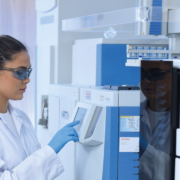GC-MS discovery of biomarkers will allow non-invasive early disease detection by breath biopsy
Owlstone Medical and Thermo Fisher Scientific recently announced a collaborative partnership to advance the early diagnosis of cancer and other diseases. This will involve the integration of Orbitrap gas chromatography mass spectrometry (GC-MS) instrumentation into Owlstone Medical’s Breath Biopsy platform, aiding metabolomics studies of breath samples for unique biomarkers that could translate into non-invasive, routine screening solutions for improved early diagnosis of cancer and other disease. CLI caught up with Dr Max Allsworth, Owlstone Medical, and Dominic Roberts, Thermo Fisher Scientific, to discuss how MS has benefited clinical lab diagnostics.
Mass spectrometry is an incredibly powerful technique, used increasingly in clinical lab diagnostics. How has it been of benefit in this application?
Clinical laboratories involved in both routine and research applications are under ever-increasing pressure to deliver fast results, while maintaining the highest levels of accuracy and confidence. The majority of these laboratories currently rely on targeted analytical approaches, using both gas chromatography (GC) and liquid chromatography coupled to triple quadrupole mass spectrometry (MS) instrumentation. These techniques cover the wide range of chemical classes to be monitored at the required levels of sensitivity and selectivity. However, they are limited to those compounds in the target list and they require careful optimization of acquisition parameters for each compound. High-resolution, full-scan MS using Orbitrap technology provides a solution to meet:
- the demand for detection and quantification of a growing number of compounds;
- retrospective analysis of samples long after data acquisition; and
- identification and elucidation of the chemical composition and structure of unknown compounds.
While MS adoption in clinical settings has been somewhat limited to date, that is rapidly changing. A small number of MS-based assays have received United States Food & Drug Administration (U.S. FDA) clearance over the past few years in areas including microbiology pathogen identification, vitamin D quantitation, newborn screening and genetic analyses. One of the key benefits of MS adoption in clinical settings is its flexibility. The same instrumentation platform can be deployed into a wide variety of applications, being able to detect and measure protein, lipid, genomic, and the area with perhaps most clinical promise, metabolites. As a result, a broad range of laboratorydeveloped tests now exist in Clinical Laboratory Improvement Amendments (CLIA)-facilities with more being developed all the time.
One of the areas of greatest promise of MS in clinical settings is through the deployment of Breath Biopsy®. Metabolites, being the furthest downstream in biological processes, represent the most phenotypically relevant biomarkers that take into account both endogenous and external drivers of disease. Breath represents an extremely exciting approach to capturing these chemicals at very low levels with powerful implications for the early detection of disease and the effective delivery of precision medicine.
What current work is underway for developing the use of MS in the clinical lab?
GC-MS is Owlstone Medical’s core discovery technology, enabling us to explore volatile organic compounds in breath, seeking to link specific chemicals, and the changes in their levels, to specific diseases. In many metabolomics studies samples have to undergo a complex sample preparation protocol that can lead to complexity and variation if not controlled adequately. This is particularly true of liquid samples. However, as Owlstone Medical is identifying breath-based volatile biomarkers directly, sample preparation is relatively simple. By using thermal desorption to release the chemicals found in breath, which we have captured on a sorbent matrix in cartridges as part of our ReCIVA® Breath Sampler, the outflow can be directly introduced into a GC-MS system.
Owlstone Medical is focused on developing diagnostic and screening solutions in oncology (for example through LuCID, the world’s largest breath-based clinical trial for the discovery of breath-based biomarkers of early-stage lung cancer), liver disease (with whom they have partnered with the Cleveland Clinic), respiratory disease (working with AstraZeneca and GSK on asthma and COPD), and environmental exposure. In the future, once tests have been developed and launched into the market, sample analysis for a substantial portion of these tests will also be via GC-MS.



